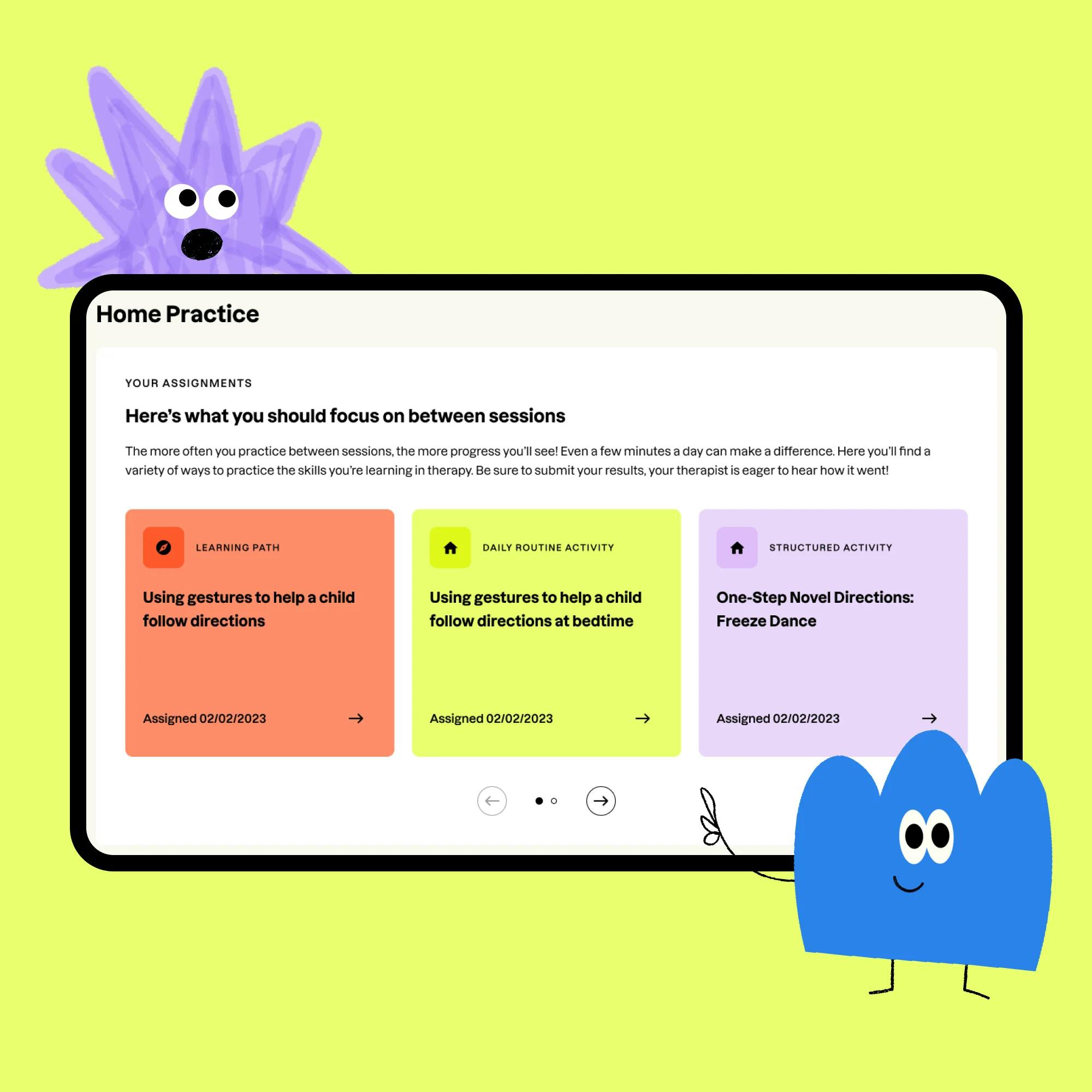Kids can receive a variety of services through their public school, and speech therapy is one of them. Some children are able to make great progress with speech therapy at school. However, for other children, school services aren't enough. They benefit from combining school therapy with private speech therapy sessions.
You may be wondering whether your child needs outside speech therapy if they receive speech therapy at school. Here are some factors to consider, along with information about the cost of speech therapy and finding a therapist.


School speech therapy vs. private speech therapy: What to consider
1 School speech therapy is often done in groups
When children have speech therapy in school, they often receive it in a group. Caseloads are often very high in schools. This means each speech therapist is working with a large number of students. In order for every child to be seen, group therapy one or two times per week is the answer.
Let’s say a child receives 30 minutes of speech therapy per session, with three other children in the group. Splitting 30 minutes of the speech therapist’s attention among four kids (who may all be working on different things) doesn’t leave a lot of time for one-on-one therapy and practice for each child. This may cause your child's progress to be slower. In comparison, private therapy focuses solely on your child’s unique needs, at a pace that suits them best.
Splitting 30 minutes of the speech therapist’s attention among four kids doesn’t leave a lot of time for one-on-one therapy for each child.
Of course, services vary from school to school. Some children are able to get one-on-one speech therapy in school. And some children are able to make the progress they need in a group. However, a group setting is a big factor when considering if your child needs more speech therapy outside of school. You may want to ask how many other students are being seen along with your child.
2 School speech therapy goals have to be educationally necessary
Expressable speech therapist Lauren Sabatier, M.S., CCC-SLP, points out that speech therapists in schools are required to follow state-mandated eligibility guidelines when qualifying children for services. She explains, “Some children may have below-average standard scores on formal assessments, but their scores aren’t low enough to qualify for therapy in the school setting.”
Speech therapy goals also must be deemed educationally necessary. In other words, school speech therapists can only provide services that directly support a child in the classroom.
School speech therapists can only provide services that directly support a child in the classroom.
For example, if a child has trouble producing /s/ sounds and also has language-based issues, the speech therapist will likely focus only on the language issues. That’s because language goals have more of an impact on academic performance. If the child’s /s/ production isn’t affecting their self-esteem or classroom participation, then the speech therapist may not be permitted to target it in their sessions.
If your child has communication needs that aren’t seen as academically necessary, this is a clear sign that outside speech therapy would be beneficial. In private speech therapy, educational requirements aren’t a factor. You can target specific speech, language, communication, feeding, or swallowing goals to ensure you're addressing all aspects of your child’s needs.
3 Your child’s speech and language progress may be limited
If you are seeing slow or limited progress in your child’s communication growth, this may be a sign that they need outside services. Every child has their own unique set of needs, style of learning, and speech therapy goals that should be addressed.
If your child isn’t showing much improvement, or if your school therapist says your child isn’t progressing at the speed they hoped, private speech therapy can help. Expressable speech therapist Kimberly Meschede, M.S., CCC-SLP, explains, "I would encourage parents to directly ask their school speech therapist if they think their child could benefit from outside services. From my experience working in the schools, most therapists embrace parents wanting more options to support their child, and they wouldn’t be offended at all!”
Parents can directly ask their school speech therapist if they think their child could benefit from outside services.
Keep in mind, of course, that kids don’t gain new skills overnight. Progress toward speech therapy goals may not always be easily noticeable. However, if your child has been in speech therapy for a few months at school and you’re not seeing changes, they may need extra therapy to get them where they need to be.


4 Your child might need help using their new skills at home
On a similar note, over time you should be seeing “generalization” of the speech and language skills your child is learning in therapy. This means that whatever they’re able to do in therapy sessions, they should also be doing at home. Here’s an example. Let’s say the speech therapist tells you that your child is using correct verb tenses in their sentences. But you don’t see that going on at home. That’s a sign that your child isn’t using their new skills in other environments. They may be able to do it with the speech therapist, when they’re really focusing. But in everyday speech and interactions with you, they’re not yet able to use these skills. This is another sign that outside services would be helpful.


5 You might like more control over who provides speech therapy to your child
One benefit of private speech therapy is that you may have more choice in who you see. Many speech therapists have areas of specialty. Supplementing with speech therapy outside of school allows you to choose a therapist who specializes in an area where you have concerns. Working one-on-one with a specialized speech therapist can lead to faster progress.


How to find private speech therapy
If you think your child may need more speech therapy outside of school, there are a few different ways to find it.
One is to look for a clinic or private practice near you. Your child’s pediatrician will likely have some recommendations, as well as your child’s school speech therapist.
Don’t forget to search online or talk with other families for recommendations. Reading online reviews or hearing about other people’s experiences can help you decide on a good fit for your kiddo.
Online speech therapy is a convenient option that allows you to see a speech therapist in the comfort of your own home–that means no commute! You’ll get to know your child’s speech therapist and can observe and participate in sessions. There may be more flexibility with scheduling, with some providers offering evening and weekend appointments. Plus, online speech therapy often costs less than in-person therapy.
Extensive research has been done on the outcomes of teletherapy for speech-language disorders. The results are clear: Done properly, online speech therapy is effective.
Think about your child’s personality, their needs, and what would work best for your family’s lifestyle. This will help you start the search for the perfect speech therapist.


How much does speech therapy cost?
Of course, one of the benefits of receiving speech therapy in school is that it’s free for families. Cost is a factor with private speech therapy.
Your health insurance may cover speech therapy to some extent. The greatest benefit to using health insurance is that it saves you money. Every health plan will vary in terms of how much of the cost is covered, how long speech therapy is covered, and which providers are in-network with the insurance company. This article explains the pros and cons of using insurance versus paying for speech therapy yourself, out of pocket. It also offers tips for finding affordable therapy, so you can get your child the support they need to communicate clearly and confidently.
Ultimately, you want your child to receive the best possible support and opportunities for success. By combining outpatient speech therapy with school-based services, you'll have a well-rounded, comprehensive approach that addresses all your child’s needs and fosters their continued growth and development.
How Expressable Can Help
Concerned your child isn't reaching age-expected milestones? Looking for communication support from a professional? Expressable is a national online speech therapy practice serving children and adults. We treat all major areas of communication and feeding, offer flexible hours including evenings and weekends, and accept most major health insurance plans. We’re proud to have earned more than 3,000 5-star reviews from our clients (4.9/5 average).
Our therapy model is centered on parent and caregiver involvement. Research proves that empowering caregivers to participate in their loved one’s therapy leads to better outcomes. That’s why we combine live, 1-on-1 speech therapy with personalized education and home practice activities for faster progress.
Communication is more than words. It’s how we share how we feel and show who we are. We’re here to help you or your child do just that.

 Abby Barnes, M.S., CCC-SLP
Abby Barnes, M.S., CCC-SLP





